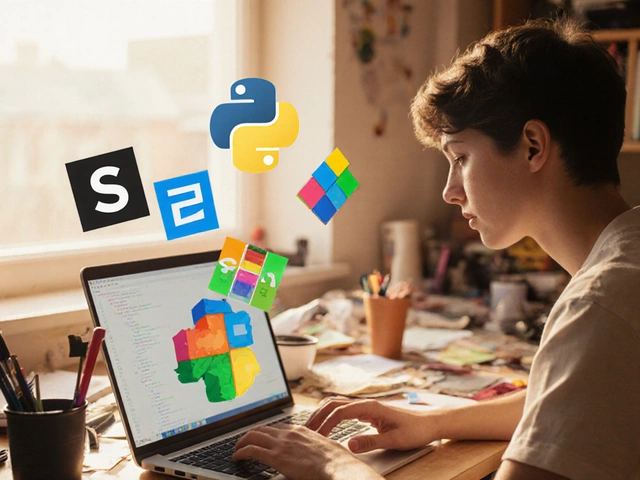Scroll through social media or job listings, and one thing’s obvious: what you know is constantly being reshuffled by the internet. Yesterday’s must-have skill is tomorrow’s trivia answer. Remember when learning how to use WordPerfect made you the office wizard? Nobody does. The real kicker? The best thing to learn online isn’t what you think. It’s not about chasing the latest trend, or piling random certificates. The smartest pick is the one that changes doors from closed to wide open—landing you a dream job, a business, a creative outlet, or new freedom that you couldn’t buy at the store.
What Makes a Skill the Best Thing to Learn Online?
Let’s clear something up right away: there’s no one-size-fits-all answer. But some skills pack more punch than others, and it isn’t always obvious. Tech keeps stealing the spotlight, sure, but the real value is in skills that stay relevant no matter how the world shifts. Ask around and you’ll hear big names like coding, data analysis, and digital marketing—each one tied to remote work, entrepreneurship, and today’s fastest-growing fields. In 2024, LinkedIn’s jobs report showed that seven of the top ten in-demand roles called for digital know-how. Even more interesting, 87% of managers said they trusted certificates from recognized e learning platforms—just as much as traditional degrees.
What’s amazing is how the internet flips the rules. Anyone, anywhere can access Ivy League lectures or join a beginners’ AI workshop, with zero commute—all it takes is wifi and motivation. According to Coursera’s Global Skills Report 2024, people from countries with lower access to traditional education are now outpacing some wealthier nations in online certification rates. The web kicked down barriers that used to shape someone’s entire future. And it isn’t only about technical skills. Emotional intelligence, communication, and critical thinking are being taught online in new, engaging formats. A Harvard study in early 2025 found that managers who regularly take soft-skills courses online reported 17% better team engagement and retention.
So, what turns a good skill into the best thing to learn online? Three things: demand, transferability, and adaptability. Demand means real employers, clients, or collaborators are looking for it right now. Transferability is your ability to take what you learn and apply it to multiple jobs, industries, or even side hustles. Adaptability makes sure you’re not locked in—if things shift, you can pivot, not panic.
The Most Rewarding Skills and Courses Right Now
If you want the internet to pay off, it’s worth knowing what’s hot (and why). In 2025, you can’t go wrong with a shortlist of game-changers. Here are some top skills with consistent ROI:
- Programming & Coding: Whether it’s Python, JavaScript, or even newer languages like Rust, the digital world runs on code. Learning to program opens doors not only to tech jobs, but also in marketing, automation, and data science. Sites like Codecademy and freeCodeCamp offer structured, project-based curriculums that don’t just teach theory—they get you building real stuff, from web apps to machine learning projects.
- Data Analysis: Big data isn’t just a buzzword. Companies live and die by their ability to make sense of numbers. Courses in SQL, Excel, Tableau, and R from platforms like Coursera or Udemy are exploding in popularity. In one 2024 Udemy survey, data analysis topped the list for career changers and students alike.
- Digital Marketing: From SEO to social media strategy, brands will always chase online attention. Certification programs from Google, HubSpot, and Meta help you pick up skills you can apply to small businesses, your own projects, or freelance gigs. Knowing how to get eyes on content—or convert users at the right time—is pure gold.
- UI/UX Design: With every business moving online, making websites and apps easy to use is vital. Courses in Adobe XD, Figma, and user research help you jump into a creative, well-paid field. General Assembly and Springboard both offer project-based, mentor-supported learning with direct pipelines to remote work.
- Business & Entrepreneurship: The right online business course can transform somebody’s side hustle into their full-time gig. Harvard’s and Wharton’s online programs see tens of thousands of business courses completed every year, especially in areas like leadership, e-commerce, and start-up finance.
- Languages: Mastering English or another global language unlocks global opportunities. Duolingo, Babbel, and more serious platforms like iTalki make this easier than ever. Fun fact: people who learned a language online in 2024 reported a 22% higher chance of landing a remote job that required it.
- Soft Skills: Critical thinking, leadership, and emotional intelligence are skills robots can’t automate. Courses from platforms like Skillshare and LinkedIn Learning offer bite-sized lessons that shape better managers and communicators.
Each of these routes can pay off, but tech isn’t the only ticket. Creative skills—like digital art, music production, or video editing—are booming. YouTube and TikTok have given creatives a stage and a way to make money. Skillshare spotted a 30% year-over-year jump in sign-ups for graphic design and video editing classes in early 2025.

How to Choose the Right Skill & Course for You
Feeling lost with so many options? The best advice: stop thinking about what sounds cool and start asking what you want to achieve. Do you want a new job? To freelance, automate tasks, build something, or just learn for personal growth? Start there. If you want a career boost, look up current job postings in your desired field. What skills are in bold? Those are your targets.
Your learning style matters, too. Need structure and feedback? Go for guided courses with mentorship—think Coursera or Springboard. Prefer to explore at your own pace or follow short tutorials? Udemy and YouTube are goldmines. Love hands-on projects? Look for courses that get you building things, not just watching videos.
Here’s a little trick: stack your skills. If you learn Python, add SQL or data visualization. Combine digital marketing and basic design. Employers love agility—a mix of skills makes you stand out. And don’t sleep on certificates. According to a 2025 LinkedIn report, certifications from platforms like Google, AWS, or Meta were mentioned by 40% of successful job applicants in digital fields.
Another tip—join online communities. Reddit, Discord, and specific course forums let you swap tips, troubleshoot problems, and network with people who’ve walked your path. Collaboration can turn a frustrating homework problem into a full-blown business idea or partnership.
The cost is another big plus. You don’t need to burn through savings. Many respected platforms offer free courses or affordable subscriptions. For example, HarvardX and Yale Online post entire course catalogs for anyone to audit, and many offer certification for a small fee if you need it for work credentials. Smart learners use sales, scholarship offers, and even employer training budgets.
Turning Online Learning Into Real-World Results
Let’s be honest, plenty of people collect online courses—and never put them to use. If you want actual results, make whatever you learn real. Here’s how:
- Pick a project. Build a simple web app, launch a one-page business, or analyze a real dataset. Make your skills visible and concrete. Recruiters say they’re way more impressed by a GitHub portfolio or a working prototype than a PDF certificate.
- Share progress publicly. Blog about your learning journey. Post on LinkedIn or X (Twitter). Even sharing setbacks makes you memorable (and keeps you honest).
- Set a schedule. Block out consistent times to learn. A Stack Overflow survey in April 2025 showed that learners who devoted even 20-30 minutes daily finished courses at nearly double the rate of occasional crammers.
- Find accountability. Join a cohort or get a learning buddy. Some platforms like Udacity and Coursera run group challenges; finishers are entered for job referrals or prizes.
- Plan immediate next steps. Don’t stop once the course ends. Apply for jobs, take on freelance work, or offer to help a nonprofit with your new skills. You’ll be surprised at how quickly people say yes to free or discounted help—and you get results for your resume or portfolio.
The numbers back this up. According to a 2025 Google Career Certificates survey, 79% of completers reported a positive career impact—like a raise, promotion, or landing a new role—within six months of finishing. Plus, people who practiced what they learned saw better retention, confidence, and long-term earning gains.
| Skill | Course Platform | % of Learners | % Saw Career Boost |
|---|---|---|---|
| Python Programming | Coursera/Udemy | 36% | 81% |
| Data Analysis | Coursera/edX | 28% | 77% |
| Digital Marketing | Google Skillshop | 24% | 64% |
| Project Management | Google/Udacity | 20% | 67% |
| UI/UX Design | Springboard/edX | 19% | 71% |
Online learning isn’t slowing down. The tools are out there, and the knowledge has never been so accessible. The real question isn’t “what’s the best thing to learn online?” It’s: what do you want to do next, and what will you build once you have the skill?








